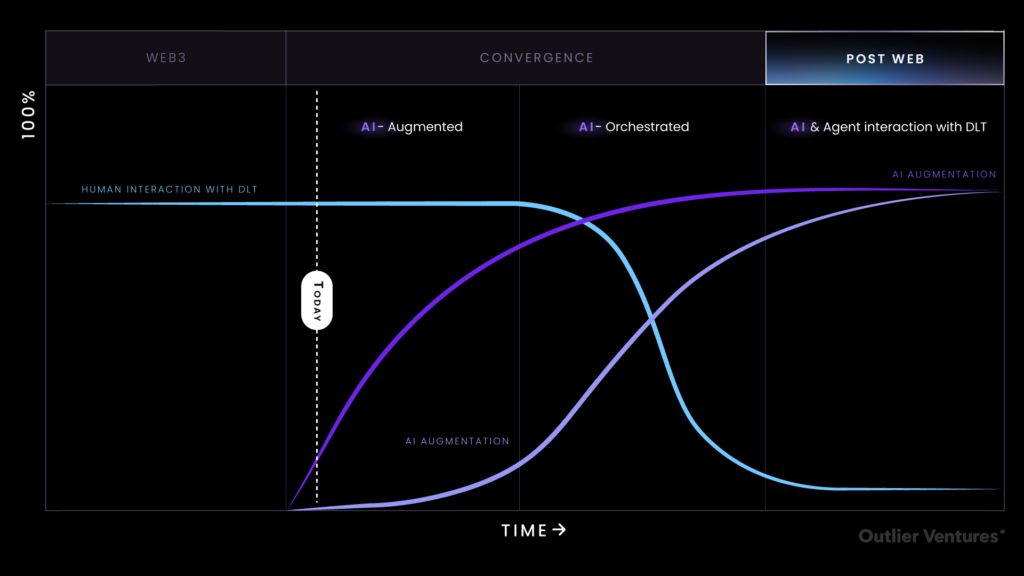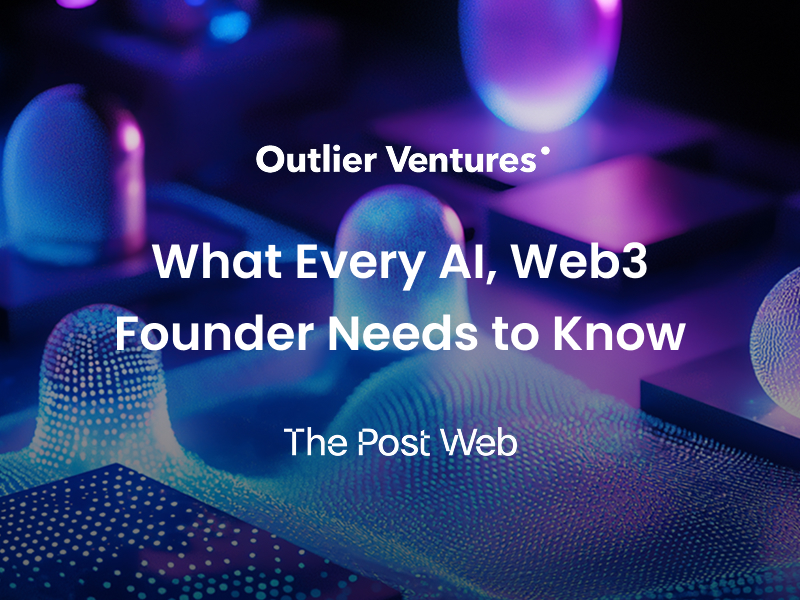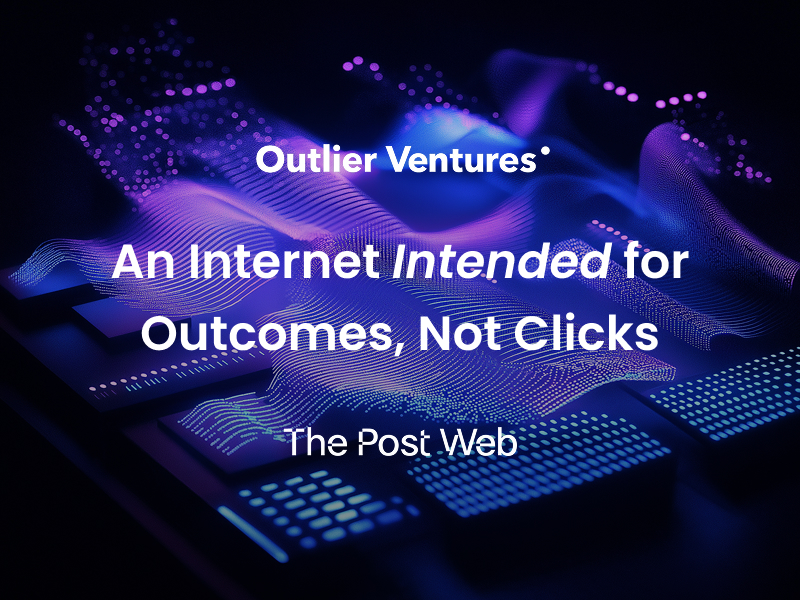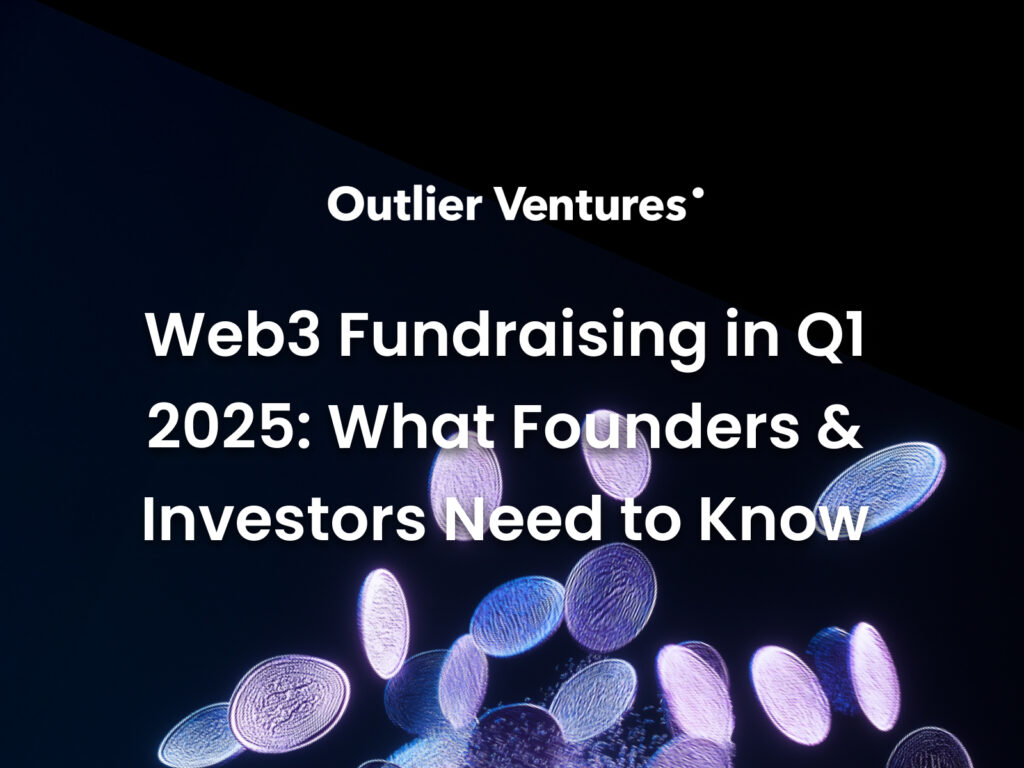Welcome back to The Post Web Deep Dive, your guide to our vision for an internet redefined by AI agents, decentralization, and programmable incentives. In this blog, we explore how tokens evolve from speculative assets into the operating system of the machine economy.
We are entering The Post Web, a radical re-architecture of the internet where AI agents act on our behalf, decentralized systems coordinate the backend, and the interfaces we know today quietly disappear. In this new era, tokens aren’t just a feature of the system.
They are the system.
Tokens are no longer simply digital currencies or speculative assets. They are becoming critical infrastructure that powers incentives, enables coordination, and facilitates governance in ecosystems where humans and machines collaborate in real time.
The convergence of AI and distributed ledgers has set the stage for a new economic paradigm: one not based on extracting attention, but fulfilling intention. And the programmable, composable, and verifiable tokens are the coordination layer making this shift possible.

Let’s explore the role of tokens in enabling a smarter, fairer internet: one where agents transact autonomously, ownership is encoded, and systems evolve through participation rather than control.
How Tokens and Agents Are Reshaping the Internet
Tune into this keynote where our founder touches on token engineering, the death of the attention economy, and how The Post Web flips the logic of startups on its head.
Tokens as Infrastructure, Not Speculation
In the Post Web, tokens become multi-functional primitives powering incentives, automating governance, coordinating agent activity, and embedding trust in web ecosystems.
One of the most foundational roles of tokens is their ability to incentivize early participation and resource contribution within decentralized systems, particularly in DePINs.
In DePINs, tokens are the bootstrap layer. They reward contributors for supplying real-world resources and create early economic incentives that attract both humans and machines. This bottom-up coordination is how cold-start problems get solved and scale is achieved without centralized capital.
Over time, tokens align the interests of builders, operators, and users, transforming loosely coordinated communities into self-sustaining ecosystems with clear economic flywheels.
Governing Systems Where Users Don’t Have to Be There
Beyond incentives, tokens are fundamental to enabling distributed governance. In decentralized protocols and DAOs, governance tokens empower users to participate in critical decisions, from protocol upgrades to treasury allocation.
But in The Post Web, the game changes.
Autonomous agents, governed by token-permissioned rulesets, can act, vote, and evolve on behalf of users. While DAO governance today faces issues like low voter participation and governance capture, the integration of agent-delegated voting, governed by token-based permissions, offers a promising path toward scalable, inclusive, and data-informed decision-making in complex decentralized environments.
Programmable Currency for Programmable Agents
AI agents don’t use credit cards. So, they require a native digital medium of exchange that is programmable, permissionless, and interoperable across services, protocols, and ecosystems.

Whether through stablecoins for reliable transactions or domain-specific utility tokens embedded with business logic, AI agents use tokens to access services and APIs, purchase data or compute resources, and coordinate with other agents across decentralized environments.
In an intent-based architecture, where agents coordinate to fulfill user needs, tokens serve as the economic substrate that replaces Web2’s legacy payment systems with machine-native coordination tools.
Enabling Ownership, Control, and Trust at Scale
In The Post Web, you don’t just own a wallet – you may own agents, datasets, compute capacity, or shares in community infrastructure. Tokens make that ownership verifiable, portable, and enforceable.
Rather than centralizing control in platforms, tokens enable ownership rights over digital agents and infrastructure, grant permissioned access to private services or datasets, and facilitate revenue sharing models with aligned incentives among stakeholders.
Likewise, tokens are instrumental in designing accountability systems for autonomous actors. Through staking and slashing mechanisms, agents (or their operators) can be required to post collateral that is forfeited in cases of faulty behavior, incentivizing performance and trustworthiness in environments where reputation must be enforced algorithmically.
Why This Matters Now
The transition from the Attention Economy to the Intention Economy is not theoretical, it is already underway. In this new model, AI agents don’t fight for clicks, they fulfill goals. And tokens, as programmable and composable instruments of coordination, are a fundamental part of this shift.
Tokens are how we coordinate this future:
- Economic incentives replace ad-based monetization
- Ownership primitives replace account-based access
- Machine-readable rules replace human-mediated workflows
Organizations and builders who understand the power of tokens, not merely as financial instruments but as incentive mechanisms and coordination protocols, will shape the platforms, products, and economic models of the next decade.
The Post Web will not be centrally planned. It will be emergent, agentic, and token-powered. So, let’s stop thinking of tokens as a category of assets. They are the operating system of the machine economy.
Build the Token-Powered Future
If you’re designing coordination systems, building agent infrastructure, or rethinking what tokens can do beyond speculation…you’re already thinking in Post Web terms.
The Post Web Accelerator is a 12-week, remote accelerator for founders at the edge of AI, Web3, and decentralization. We offer funding, hands-on support, and a deeply engaged network of peers and mentors. Applications are open now.
If you’re serious about shaping the machine economy, don’t wait.
Dive Deeper: Chapter 1 of The Post Web Thesis
Want to go beyond the blog?
Chapter 1 of The Post Web Thesis lays out the foundations of the token-powered internet — from agentic coordination to economic design for the machine age.





